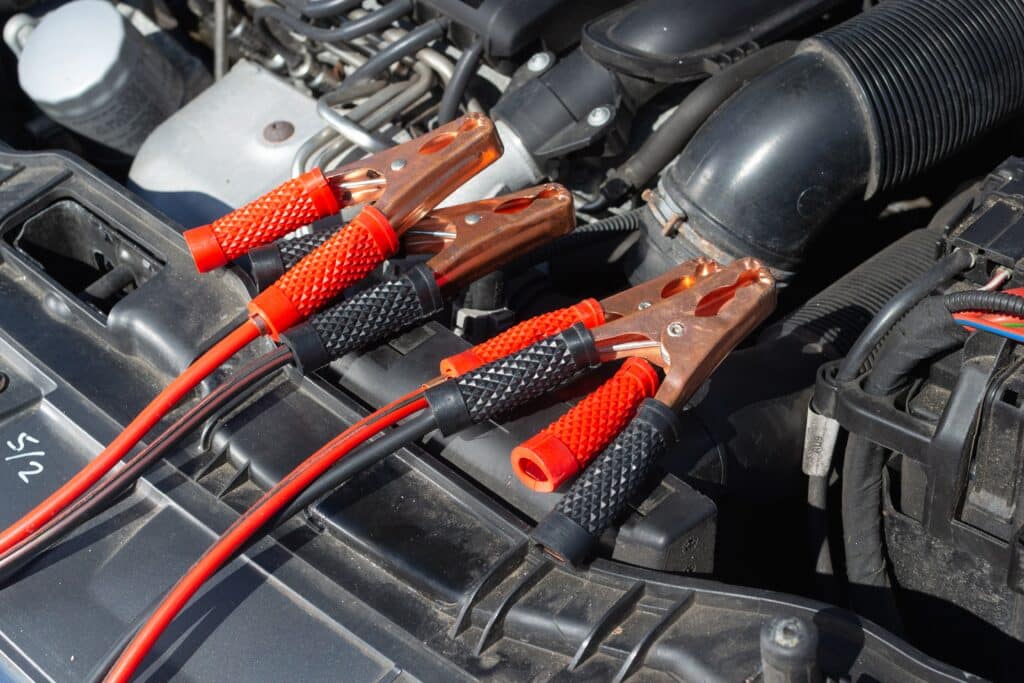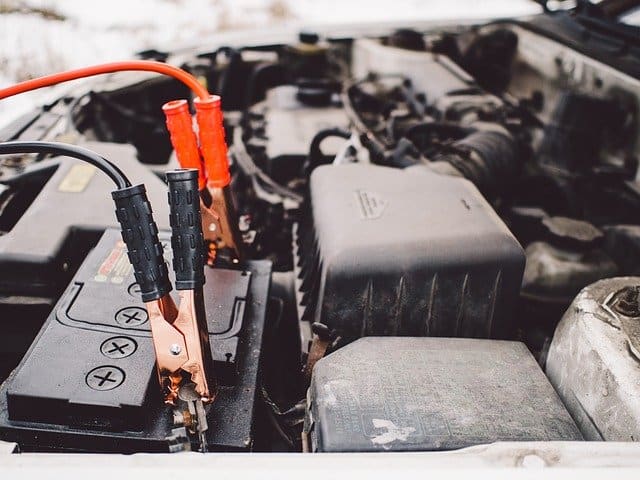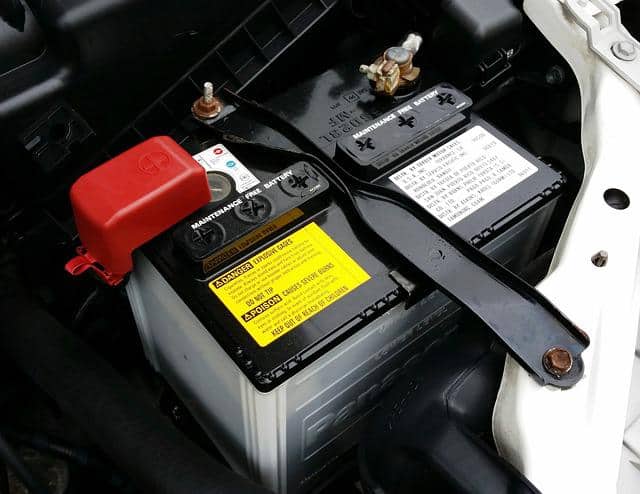Introduction – Specific Circumstances Can Lead To Overcharging A Car Battery
[Dislcaimer: we are not experts on cars so consider the following the information gathered by a non-expert]
ShrinkThatFootprint recognizes that traditional internal combustion batteries should be recycled or reused, rather than thrown away unless they are defective. By recharging, recycling or reusing batteries, we avoid the enormous carbon emissions associated with the production costs of a new car battery.
One question that gets asked – can you overcharge a car battery? The simple answer is yes; you can overcharge a car battery. To know when you’re in such a situation and how to avoid it, read on.

When the battery is charging, the internal voltage rises until it reaches the “charged” level. At this point the energy coming into the battery needs to shut off. You can be in one of two situations.
Signs Of An Overcharged Car Battery
If you notice any of the following signs, your car battery is overcharged:
1. Battery is leaking
If you notice that your car battery is leaking, there’s a chance it’s overcharged. When a battery is overcharged, the chemicals inside it start to break down and produce a corrosive acid. This acid will eat away at the battery casing, causing it to leak.
2. Battery is bulging
Another sign of an overcharged car battery is if it starts to bulge. This is caused by the same process that causes the battery to leak; the chemicals inside the battery break down and produce a corrosive acid. This acid will eat away at the battery casing, causing it to bulge.
3. Battery is hot to the touch
If you notice that your car battery is hot to the touch, it’s possible it’s overcharged. When a battery is overcharged, the chemicals inside it start to break down and produce a lot of heat. This heat will cause the battery to become hot to the touch.
4. Battery is emitting strange smells
When a battery is overcharged, the chemicals inside it start to break down and produce a corrosive acid. This acid will produce a strong, unpleasant smell.
5. Battery is producing sparks or fire
If you notice that your car battery is producing sparks or fire, it is definitely overcharged. When a battery is overcharged, the chemicals inside it start to break down and produce a lot of heat. This heat can cause the battery to produce sparks or even catch fire.
Confirming A Car Battery Is Overcharged
If you think your car battery may be overcharged, you can confirm this by testing the battery with a voltmeter. To do this, simply connect the voltmeter to the positive and negative terminals of the battery. If the voltmeter reading is above 14 volts, then the battery is overcharged.
Modern Battery Chargers Have Automatic Shut-Off
If you have a modern charger then it will automatically shut off. The charger will have settings to specify what type of battery is being charged and therefore what is the appropriate condition to shut off. For example, a charger could have settings for 6 volts or 12 volts, and lead acid vs lithium charging, and finally the correct voltage. A charging current of 2 amperes is common.
Charger With No Automatic Shut-Off Or Broken Charger
If you have a device that charges with no shut-off, or on the wrong settings such as excessive current, or simply broken, then there is a potential for overcharging of the battery. I think the moral of the story here is don’t leave the battery unattended while its charging and certainly not overnight. Either check the charging gauge or disconnect and start the car to test the battery instead of leaving it by itself too long.
What Happens To Overcharged Batteries?
With excess energy flowing into the battery, past the point of being “full” with the ions in their charged positions, the battery will heat up. When it heats up, it causes chemical reactions. Gases can form and the entire battery might rupture. The contents of the battery are also quite toxic, not something you want to get on your skin.
Why Batteries Should Be Recharged And Not Left To drain
Lead and acid are used in the construction of automobile batteries, which leads to sulfation. When the battery’s lead and acid combine, they form lead sulfate. Lead sulfate is a substance that prevents the battery from retaining its charge. If your battery is sulfated, it won’t be able to start your car. A battery can quite simply die if it isn’t used for a long period.
The good news is that you can usually revive a sulfated battery with a little effort. The first step is to clean the battery terminals. You can do this with a toothbrush and some baking soda. In this article, I will discuss more battery life and overcharge issues.

However, it’s not that easy to do. Most modern chargers are designed to cut out long before the battery is fully charged. So, unless you’re using an old charger or deliberately trying to overcharge your battery, it’s not something you’re likely to do by accident.
Of course, even if you can’t overcharge your battery by accident, there are still some situations where you might want to deliberately overcharge it. For example, if your battery is very low and you need to get your car moving again urgently, then charging it for a little longer than usual might be the only way to do it. Just be aware that if you do this too often, it can cause damage to your battery and shorten its lifespan.
So there you have it – can you overcharge a car battery? Yes, but it’s not easy to do accidentally. And in most cases, it’s not something that you’ll need to worry about at all.
Is It Safe To Leave A Car Battery Charger On Overnight?
The answer is not as simple as a yes or no. Before deciding if it is safe to leave a car battery charger plugged in overnight, consider the following factors. One factor is the type of charger being used. Another factor is the condition of the car battery. And lastly, you must also consider the environment in which you will use the charger. Let’s explore each of these factors in more detail.
Type Of Charger:
The type of charger is an important factor to consider when deciding if it is safe to leave a charger on overnight. Using a standard charger, it is generally safe to leave it on overnight. However, if you use an accelerated charger, leaving it unattended for extended periods is not recommended. This is because accelerated chargers generate more heat, potentially damaging the car battery or starting a fire.
Condition of A Car Battery:
The car battery’s condition also needs to be considered when deciding if it is safe to leave a charger on overnight. If the battery is already in good condition, leaving the charger on overnight is less likely to be damaged.
If the battery is old or in poor condition, there is a greater risk of damage from leaving the charger unattended. In this case, it is best to charge the battery for shorter periods and monitor it closely for any signs of damage.
Environment:
The environment in which you will use the charger is also important to consider when deciding if it is safe to leave a charger on overnight. If the charger will be used in an enclosed space, such as a garage, there is a greater risk of fire and/or damage to the car from leaving the charger unattended.
In this case, it is best to charge the battery for shorter periods and monitor it closely for any signs of damage. On the other hand, if the charger is used outdoors in an open area, there is less risk of fire and/or damage to the car from leaving the charger on overnight.
After considering all of these factors, you can decide if it is safe to leave your car battery charger on overnight. If you have any concerns about doing so, it is always best to err on the side of caution and charge your battery for shorter periods instead.

Can You Overcharge A Car Battery With A Trickle Charger?
Yes, if you’re not careful. Trickle chargers are meant to deliver a slow and steady charge to a car battery, but they can overcharge it if left connected for too long.
This can damage the battery, reducing its lifespan and making it more likely to fail. However, if you use a trickle charger correctly, you can avoid overcharging your car battery.
Make sure you disconnect the charger as soon as the battery is fully charged, and don’t leave it connected for longer than necessary. You can keep your car battery healthy and prevent damage from overcharging with proper care.
In Conclusion
In conclusion, leaving a car battery charger on is never advisable overnight. There are several risks associated with doing so, including fire hazards and damage to the battery. If you need to charge your car battery, make sure you do so for shorter periods and monitor the process closely. With proper care, you can avoid overcharging your car battery and keep it healthy for years to come. Thanks for reading!
